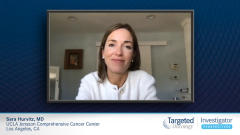
Potential Role for Amcenestrant in the Treatment of ER+/HER2- Advanced Breast Cancer
Sara Hurvitz, MD, provides insight on the potential role of amcenestrant in the treatment of HR+ breast cancer in the future.
Sara Hurvitz, MD: In summary, the treatment for hormone receptor-positive HER2-negative [human epidermal growth factor receptor 2] advanced breast cancer continues to rapidly evolve. When I look back only 15, 20 years ago now, the most common agent that we were using for this type of breast cancer in the advanced setting was tamoxifen as we were just beginning to learn about the use of aromatase inhibitors. Fast-forward, now we have an IM administered SERD, [intramuscular selective estrogen receptor degrader or downregulator] fulvestrant, which has shown very good efficacy, maybe even better than aromatase inhibitors, although patients have to undergo IM injections which is not comfortable. We have the availability of PI3 kinase pathway inhibitors, including everolimus and more recently, alpelisib, in combination with endocrine therapy. And now we also have cyclin-dependent kinase[CDK] 4/6 inhibitors or CDK4/6 inhibitors, palbociclib, ribociclib, and abemaciclib, which have shown remarkable improvements in objective response rates, clinical benefit rates, progression-free survival for patients [receiving a diagnosis of] this disease in both the first-line and second-line settings.
It’s going to be interesting to see how the field evolves going forward. We do know that mutations can be accumulated in metastatic breast cancer causing resistance to therapy. For example, the accumulation of ESR-1 [estrogen receptor-1] mutations, the gene for estrogen receptor, can lead to resistance to treatments such as aromatase inhibitors and sometimes even fulvestrant. Finding new therapies, such as oral SERDs that may be able to work on tumors that have these types of mutations, is going to be an important discovery and move forward in this field.
My hope is that we will continue to increase our armamentarium of agents available for patients with ER [estrogen receptor-positive]-positive breast cancer, delaying the time that a patient can wait before needing to go on to chemotherapy which is more toxic. And my hope is also that as data continue to emerge and mature from registry trials, that we begin to see we are pushing the boundary of the envelope now and seeing longer median overall survivals for patients whose disease is diagnosed today. Thank you.
Transcript edited for clarity.









































